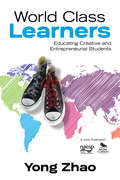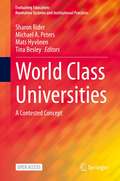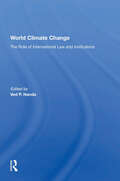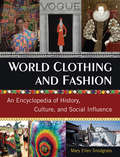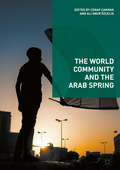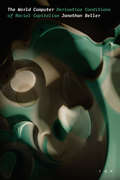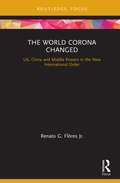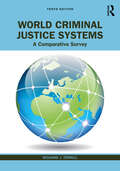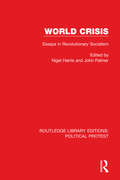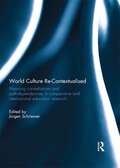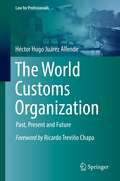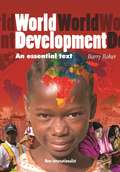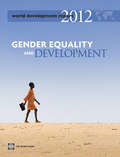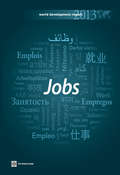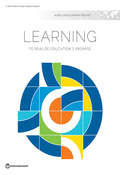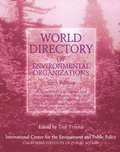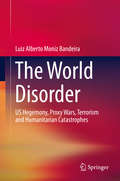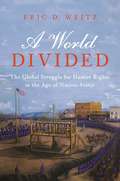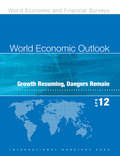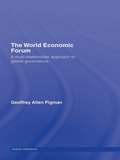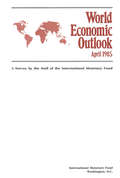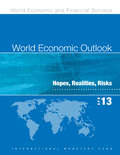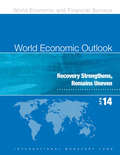- Table View
- List View
World Class Learners: Educating Creative and Entrepreneurial Students
by Yong ZhaoPrepare your students for the globalized world! To succeed in the global economy, students need to function as entrepreneurs: resourceful, flexible and creative. Researcher and Professor Yong Zhao unlocks the secrets to cultivating independent thinkers who are willing and able to create jobs and contribute positively to the globalized society. This book shows how teachers, administrators and even parents can: Understand the entrepreneurial spirit and harness it Foster student autonomy and leadership Champion inventive learners with necessary resources Develop global partners and resources
World Class Learners: Educating Creative and Entrepreneurial Students
by Yong ZhaoPrepare your students for the globalized world! To succeed in the global economy, students need to function as entrepreneurs: resourceful, flexible and creative. Researcher and Professor Yong Zhao unlocks the secrets to cultivating independent thinkers who are willing and able to create jobs and contribute positively to the globalized society. This book shows how teachers, administrators and even parents can: Understand the entrepreneurial spirit and harness it Foster student autonomy and leadership Champion inventive learners with necessary resources Develop global partners and resources
World Class Universities: A Contested Concept (Evaluating Education: Normative Systems and Institutional Practices)
by Michael A. Peters Sharon Rider Mats Hyvönen Tina BesleyThis open access book focuses on the dimensions of the discourse of 'The World Class University', its alleged characteristics, and its policy expressions. It offers a broad overview of the historical background and current trajectory of the world-class-university construct. It also deepens the theoretical discussion, and points a way forward out of present impasses resulting from the pervasive use and abuse of the notion of "world-class" and related terms in the discourse of quality assessment. The book includes approaches and results from fields of inquiry not otherwise prominent in Higher Education studies, including philosophy and media studies, as well as sociology, anthropology, educational theory.The growing impact of global rankings and their strategic use in the restructuring of higher education systems to increase global competitiveness has led to a ‘reputation race’ and the emergence of the global discourse of world class universities. The discourse of world class universities has rapid uptake in East Asian countries, with China recently refining its strategy. This book provides insights into this process and its future development.
World Climate Change: The Role Of International Law And Institutions
by Ved NandaWorld Climate Change: The Role of International Law and Institutions is a collection of papers on global climate problems prepared for a two-day conferences held in 1980 at the University of Denver College of Law. The papers describe and evaluate the present state if our efforts to reduce or adapt to manmade stresses on the global environment.
World Clothing and Fashion: An Encyclopedia of History, Culture, and Social Influence
by Mary Ellen SnodgrassTaking a global, multicultural, social, and economic perspective, this work explores the diverse and colourful history of human attire. From prehistoric times to the age of globalization, articles cover the evolution of clothing utility, style, production, and commerce, including accessories (shoes, hats, gloves, handbags, and jewellery) for men, women, and children.Dress for different climates, occupations, recreational activities, religious observances, rites of passages, and other human needs and purposes - from hunting and warfare to sports and space exploration - are examined in depth and detail. Fashion and design trends in diverse historical periods, regions and countries, and social and ethnic groups constitute a major area of coverage, as does the evolution of materials (from animal fur to textiles to synthetic fabrics) and production methods (from sewing and weaving to industrial manufacturing and computer-aided design). Dress as a reflection of social status, intellectual and artistic trends, economic conditions, cultural exchange, and modern media marketing are recurring themes. Influential figures and institutions in fashion design, industry and manufacturing, retail sales, production technologies, and related fields are also covered.
The World Community and the Arab Spring
by Cenap Çakmak Ali Onur ÖzçelikThis edited volume offers an understanding of how the international community, as a collection of significant actors including major states and intergovernmental institutions, has responded to the important political and social development of the Arab Spring. Contributors analyze the response by international organizations (UN, EU, NATO), big powers (US, Russia, China, UK), regional powers (Turkey, Iran, Israel, Saudi Arabia) and small powers (Kuwait, Qatar). The book thus makes a sound contribution to the existing literature on the Arab Spring in form of foreign policy analysis and provides an overview of the current shape and outlook of global politics.
The World Computer: Derivative Conditions of Racial Capitalism (Thought in the Act)
by Jonathan BellerIn The World Computer Jonathan Beller forcefully demonstrates that the history of commodification generates information itself. Out of the omnipresent calculus imposed by commodification, information emerges historically as a new money form. Investigating its subsequent financialization of daily life and colonization of semiotics, Beller situates the development of myriad systems for quantifying the value of people, objects, and affects as endemic to racial capitalism and computation. Built on oppression and genocide, capital and its technical result as computation manifest as racial formations, as do the machines and software of social mediation that feed racial capitalism and run on social difference. Algorithms, derived from for-profit management strategies, conscript all forms of expression—language, image, music, communication—into the calculus of capital such that even protest may turn a profit. Computational media function for the purpose of extraction rather than ameliorating global crises, and financialize every expressive act, converting each utterance into a wager. Repairing this ecology of exploitation, Beller contends, requires decolonizing information and money, and the scripting of futures wagered by the cultural legacies and claims of those in struggle.
The World Corona Changed: US, China and Middle Powers in the New International Order (Innovations in International Affairs)
by Renato G. Flôres Jr.This concise book addresses the new geopolitical realm which will ensue from the coronavirus pandemic, exploring how the main international actors will position themselves in the post-Covid-19 realities. Contrary to some analysts, the author argues that, rather than an acceleration of existing or latent trends, the post-coronavirus world will present novel and otherwise unexpected features and challenges. Even the previously ongoing tension between the US and China will morph into an additionally complex and multidimensional puzzle, making it much more difficult to manage. In this book, the author provides a few basic tools for further analysis of the evolution of the new world situation, in an innovative way. Two main axes orient how analyses will be performed: the shape and evolution of the US–China relationship (and their interactions with other international actors), and the degree of co-operation — for example, on climate change and security arrangements — in the transformed world. The author suggests that the pandemic will be responsible for new emergences and fractures, and yet our ever more divided world will at the same time support unifying forces and links, highly dependent on technological developments being shared and/or protected. The primary objective of this book is to draw a broad picture which will serve as a frame of reference for analysing how the community of international actors will react to major challenges — be they expected or unanticipated — in the post-pandemic world. It will be of immense interest to analysts, academics, politicians and students of international relations, geopolitics, strategy, and world affairs.
World Criminal Justice Systems: A Comparative Survey
by Richard J. TerrillThe revised tenth edition of this core textbook provides an understanding of major world criminal justice systems by discussing and comparing the systems of six of the world’s countries—each representative of a different type of legal system. England, France, Japan, South Africa, Russia, and China are all covered in detail, and an additional chapter on Islamic law uses three example nations to illustrate the range of practice within Sharia. Political, historical, organizational, procedural, and critical issues confronting the justice systems are explained and analyzed. Neatly organized with a parallel structure throughout the text, each chapter contains material on government, police, judiciary, law, corrections, juvenile justice, and other critical issues. A new feature of this text focuses on the nature of the political world order and the significant clash between some democratic and authoritarian governments. Of particular concern are those authoritarian governments that have seen the rise of what has been popularly referred to as the strongman leader. The countries covered in this text have seen the emergence of four such strongmen. While the rise of each occurred in different contexts, they were each facilitated in significant ways by the manner in which they asserted their control over the country’s criminal justice system. This book is suitable for undergraduate and graduate students in criminal justice, prelaw, and similar programs. Supplementary materials for instructors include test bank and lecture slides.
World Crisis: Essays in Revolutionary Socialism (Routledge Library Editions: Political Protest #26)
by Nigel Harris and John PalmerThe contributors to this book, first published in 1971, analyse as International Socialists the economic and social issues of modern society. Their findings were controversial, as was the alternative they proposed – the overthrow of the British system and its replacement by a society based on workers’ control. A central theme of the book is the need for socialists to have a scientific view of the modern world – a socialist theory.
World Culture Re-Contextualised: Meaning Constellations and Path-Dependencies in Comparative and International Education Research
by Jürgen SchriewerImpressive strands of research have shown the emergent reality of increasing world-level interconnection in almost every field of social action. As a consequence, theories and models have been developed which are aimed at conceptualising this new reality along the lines of an ‘institutionalised’ World Culture. This offers a new understanding of the worldwide diffusion of specifically modern – i.e. mainly Western – rules, ideologies and organisational patterns, and of attendant harmonisation and standardisation of fields of social action. World Culture theories have not gone unchallenged. Rather, cross-cultural studies have revealed much more complex processes of regional fragmentation and (re-)diversification; of the refraction, appropriation, and hybridisation, through distinct socio-cultural conditioning, of world-level models and ideas; and of the ongoing effectiveness both of structural path-dependencies and of specifically cultural aspects such as collective memories, social meanings, and religious (or ideological) belief systems. Comparative research has thus highlighted an intricate simultaneity of contrary currents: of the increasing world-level interconnection of communication and exchange relations on the one hand, and, on the other, the persistence of context-specific interpretations, translations, and deviation-generating re-contextualisations of world-level forces and challenges.This research provides the theoretical problematique that animates this volume. The chapters explore the conceptual tools and explanatory power of theories and models which do not just oppose or reject World Culture theory, but are instead suited to complementing and differentiating it. The volume offers an enlightening conceptualisation of the intricate interaction of global processes with local agency, and of world-level forces with the self-evolutionary potentials inherent in specific contexts, socio-cultural structures, and distinctive meanings constellations. This book was originally published as a special issue of Comparative Education.
The World Customs Organization: Past, Present and Future (Law for Professionals)
by Héctor Hugo Juárez AllendeThis book will take the reader through the past, the present, and into the future of the flagship institution of the international customs community: the World Customs Organization (WCO). The purpose is to present to the reader, in a comprehensive, orderly, and synthetic manner, the enormous contributions that this prestigious and recognized institution has been making to the secure growth of global international trade. In the development of the text, special consideration has been given to the relevant instruments in day-to-day customs work, which constitute the bases of the WCO (the Harmonized System Convention, the Revised Kyoto Convention, and the SAFE Framework of Standards, among many others), as well as those issues that are currently of specific interest to the global customs community (cross-border e-commerce, trade facilitation, and authorized economic operator, to mention but a few), trying to reconcile the various practical aspects of customs operations with their theoretical underpinnings. In the final part, the book turns to the future of customs, analyzing the most pressing challenges presented by technological advances, including the Internet of Things, artificial intelligence, 3D printing, and blockchain. In short, this book will be of great interest to all foreign trade operators, mainly to customs officials, customs brokers, carriers and international forwarding agents, managers of importing and exporting companies, as well as all those (professionals and students) who wish to deepen their knowledge of the exciting world of customs and international trade.
World Development
by Barry BakerThis essential text addresses the growing need for a dedicated coursebook for students and teachers of world development. As the source of the most respected international magazine on world development issues, the publishers have created a highly credible and accessible text to illuminate this increasingly important subject. Thematic chapters cover globalization, population, the millennium development goals, and eleven other vital topics. It distils them down to their essentials, outlining contending viewpoints and offering background material and case studies, along with high-quality color photographs, charts, and graphs. Barry Baker is a geography teacher in Oxford, United Kingdom.
World Development Report 2012
by the editors at The World BankThe WDR 2012: Gender Equality and Development will focus on the evolution of gender equality across the world in the context of the development process. The report will consider gender equality as a core development goal in itself, and will argue that gender equality matters for the pace of development. Improvements in gender equality can generate gains in economic efficiency and improvements in other development outcomes. And gender equality has consequences for the quality and representativeness of the institutions a society develops. For key dimensions of gender equality, the report will show that although many women around the world still continue to struggle with gender-based disadvantages, much has changed for the better and at a more rapid pace than ever before. But the report will also show that progress needs to be expanded, protected and deepened. In order to understand why progress has varied across dimensions of gender equality and between countries, the report will look at how markets interact with formal and informal institutions to influence household decision-making by providing incentives, shaping preferences, or imposing constraints. Markets and institutions can combine to provide strong incentives for greater gender equality, but can also fail to do so if they treat males and females differentially. Policymakers and practitioners still face gaps in knowledge both in how gender equality matters for development and how best to incorporate these links in policy design. This WDR aims to bridge these gaps by building upon the growing body of multidisciplinary theory, evidence, and data on these links while highlighting the knowledge gaps that remain.
World Development Report 2013: Jobs
by The World BankWhich should come first in the development process--creating jobs or building skills? Adopting a cross-sectoral and multidisciplinary approach, this report looks at why some jobs do more for development than others. Introductory chapters explore development through jobs and changes in demographics and job markets. Part 1 considers the transformative power of jobs to improve living standards, increase productivity, and foster social cohesion. Part 2 looks at the diverse job agendas in agrarian economies, conflict-affected countries, urbanizing countries, resource-rich countries, small island nations, and countries with high youth unemployment. Part 3 examines labor policies and active labor market programs and gives recommendations for setting policy priorities for job creation. Numerous case boxes in each chapter address topics such as the garment industry boom in Bangladesh and new forms of collective bargaining in China. The report is designed to be readable, with boxes defining basic concepts such as drivers of economic growth, plus chapter discussion questions, a glossary, and a wealth of color photos, charts, tables, and maps. The companion web site for the complete set of World Development reports offers translations, background papers, and data files, plus a free iPad app that aids in navigating the report. Annotation ©2012 Book News, Inc. , Portland, OR (booknews. com)
World Development Report 2018: Learning to Realize Education's Promise
by World Bank GroupEvery year, the World Bank’s World Development Report (WDR) features a topic of central importance to global development. The 2018 WDR—LEARNING to Realize Education’s Promise—is the first ever devoted entirely to education. And the time is right: education has long been critical to human welfare, but it is even more so in a time of rapid economic and social change. The best way to equip children and youth for the future is to make their learning the center of all efforts to promote education. The 2018 WDR explores four main themes: First, education’s promise: education is a powerful instrument for eradicating poverty and promoting shared prosperity, but fulfilling its potential requires better policies—both within and outside the education system. Second, the need to shine a light on learning: despite gains in access to education, recent learning assessments reveal that many young people around the world, especially those who are poor or marginalized, are leaving school unequipped with even the foundational skills they need for life. At the same time, internationally comparable learning assessments show that skills in many middle-income countries lag far behind what those countries aspire to. And too often these shortcomings are hidden—so as a first step to tackling this learning crisis, it is essential to shine a light on it by assessing student learning better. Third, how to make schools work for all learners: research on areas such as brain science, pedagogical innovations, and school management has identified interventions that promote learning by ensuring that learners are prepared, teachers are both skilled and motivated, and other inputs support the teacher-learner relationship. Fourth, how to make systems work for learning: achieving learning throughout an education system requires more than just scaling up effective interventions. Countries must also overcome technical and political barriers by deploying salient metrics for mobilizing actors and tracking progress, building coalitions for learning, and taking an adaptive approach to reform.
World Directory of Environmental Organizations: A Handbook Of National And International Organizations And Programs (What's Doing What Ser. #No. 2)
by Thaddeus C. Trzyna Julie DidionA reference and sourcebook to the organizations involved in environmental and resource conservation in all parts of the world and to their activities. It describes over 2000 organizations and programmes in over 200 countries, providing access to sources of information, expertise and action. A user's guide identifies who is doing what in over 50 areas, such as air quality, environmental economics, toxic materials and wildlife. There are also regional overviews, detailed analyses of the UN system, over 250 intergovernmental agencies, over 400 international NGOs, and over 1500 national organizations with full country and area listings, plus indices, a glossary and a list of landmark events.
The World Disorder: US Hegemony, Proxy Wars, Terrorism and Humanitarian Catastrophes
by Luiz Alberto Moniz BandeiraThis book offers a historical analysis of the geopolitical and geoeconomic competition between the USA and Russia, which has recently heated up again due to the eastward expansion of NATO. The analysis departs from an exploration of the USA’s foreign policy and geopolitical ambitions by illustrating the influence of Wall Street and the military-industrial complex on the country’s political decision-making. The historical review covers a wide timespan, from the Second World War and the birth of NATO, to the wars against Iraq and Afghanistan, to the rebellions that erupted in Eurasia, Northern Africa and the Middle East in the 2010’s, as well as the wars in the Ukraine and in Syria. By doing so, it reveals the influence of US neocons, the US intelligence services and the military complex on the Arab Spring, the Color Revolutions and the armed conflicts in Ukraine and Syria. Ultimately, the book depicts a new era of worldwide instability and disorder, dominated by violence and arbitrariness.
A World Divided: The Global Struggle for Human Rights in the Age of Nation-States
by Eric D. WeitzA global history of human rights in a world of nation-states that grant rights to some while denying them to othersOnce dominated by vast empires, the world is now divided into close to 200 independent countries with laws and constitutions proclaiming human rights—a transformation that suggests that nations and human rights inevitably developed together. But the reality is far more problematic, as Eric Weitz shows in this compelling global history of the fate of human rights in a world of nation-states.Through vivid histories drawn from virtually every continent, A World Divided describes how, since the eighteenth century, nationalists have struggled to establish their own states that grant human rights to some people. At the same time, they have excluded others through forced assimilation, ethnic cleansing, or even genocide. From Greek rebels, American settlers, and Brazilian abolitionists in the nineteenth century to anticolonial Africans and Zionists in the twentieth, nationalists have confronted a crucial question: Who has the "right to have rights?" A World Divided tells these stories in colorful accounts focusing on people who were at the center of events. And it shows that rights are dynamic. Proclaimed originally for propertied white men, rights were quickly demanded by others, including women, American Indians, and black slaves.A World Divided also explains the origins of many of today's crises, from the existence of more than 65 million refugees and migrants worldwide to the growth of right-wing nationalism. The book argues that only the continual advance of international human rights will move us beyond the quandary of a world divided between those who have rights and those who don't.
World Economic and Financial Surveys World Economic Outlook, April 2012: Growth Resuming, Dangers Remain
by International Monetary FundThe April 2012 issue of the World Economic Outlook assesses the prospects for the global economy, which has gradually strengthened after a major setback during 2011. The threat of a sharp global slowdown eased with improved activity in the United States and better policies in the euro area. Weak recovery will likely resume in the major advanced economies, and activity will remain relatively solid in most emerging and developing economies. However, recent improvements are very fragile. Policymakers must calibrate policies to support growth in the near term and must implement fundamental changes to achieve healthy growth in the medium term. Chapter 3 examines how policies directed at real estate markets can accelerate the improvement of household balance sheets and thus support otherwise anemic consumption. Chapter 4 examines how swings in commodity prices affect commodity-exporting economies, many of which have experienced a decade of good growth. With commodity prices unlikely to continue growing at the recent elevated pace, however, these economies may have to adapt their fiscal and other policies to lower potential output growth in the future.
The World Economic Forum: A Multi-Stakeholder Approach to Global Governance (Global Institutions)
by Geoffrey Allen PigmanThis book explores the paradoxes and unique characteristics of the World Economic Forum, highlighting contemporary issues and debates on global governance, economic development and corporate social responsibility. The Forum is one of the most influential, but least understood, global institutions. Its annual meeting in Davos, Switzerland and its regional summits held around the world attract a significant and powerful audience from the worlds of business, economics, politics and civil society. The participants, who include business and political leaders, representatives of international institutions and civil society organizations, academia and the media, meet to debate issues of global concern and to develop possible solutions. Forum members see the organization as an innovative venue bringing together different types of stakeholders to solve global problems. To its critics, however, the Forum’s public face conceals a private venue for making business deals. With clear and concise sections, including boxes containing key ideas and arguments, The World Economic Forum is a much needed introduction to an important and controversial organization and will be of considerable interest to students and practitioners of international business, international political economy, economics, development, international relations, and globalization.
World Economic Outlook: Interim Assessment December 1997
by International Monetary FundThe economic and financial crisis that erupted in southeast Asia in July 1997 had continued to deepen and broaden as of December, and spillover effects from investor' deteriorating confidence in emerging market economies were being felt throughout the global financial system. This special Interim Assessment of the World Economic Outlook revises regional and global economic projections made by the IMF staff, as published in the October 1997 issue, in light of the crisis;charts the buildup to the crisis and its onset and evolution;assesses effects on the advanced economies and on private financing for developing countries;and raises policy issues that the crisis has posed.
World Economic Outlook, April 1985
by International Monetary FundThe performance of the world economy in 1984 turned out to be considerably better than had been expected at the beginning of the year. Output grew robustly in the industrial countries, especially in the United States and Japan;inflation continued to decline;and the developing countries saw a noteworthy improvement both in their balance of payments position and in their domestic growth performance. Fears that the debt situation might deteriorate did not materialize.
World Economic Outlook, April 2013: Hopes, Realities, Risks
by International Monetary FundA report from the International Monetary Fund.
World Economic Outlook April 2014: Recovery Strengthens, Remains Uneven
by International Monetary FundA report from the International Monetary Fund.
